

Traumatic Brain Injuries: Memory. Impaired memory is one of the universal problems of people with head injury.
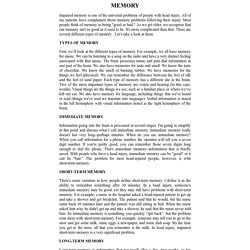
All of my patients have complained about memory problems following their injury. Most people think of memory as being "good or bad. " As we get older, we recognize that our memory isn't as good as it used to be. It's more complicated than that. There are several different types of memory . First, we’ll look at the different types of memory. Information going into the brain is processed at several stages. There's some variation in how people define short-term memory. Long-term memory is information that we recall after a day, two weeks, or ten years. Before we go on with memory, let's talk about two common things that happen with people with head injuries: retrograde and anterior grade amnesia. Another form of memory loss is called anterior grade amnesia. Researchers seek clues to brain injuries.
Posted: Monday, September 24, 2012 1:00 am | Updated: 11:28 am, Thu Jan 17, 2013.
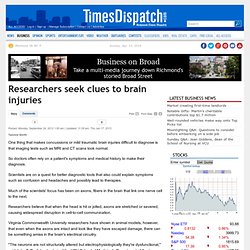
Researchers seek clues to brain injuries Tammie Smith Richmond Times-Dispatch One thing that makes concussions or mild traumatic brain injuries difficult to diagnose is that imaging tests such as MRI and CT scans look normal. So doctors often rely on a patient's symptoms and medical history to make their diagnosis. An online service is needed to view this article in its entirety. Scientists discover previously unknown cleaning system in brain. A previously unrecognized system that drains waste from the brain at a rapid clip has been discovered by neuroscientists at the University of Rochester Medical Center.
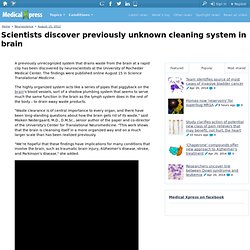
The findings were published online August 15 in Science Translational Medicine. The highly organized system acts like a series of pipes that piggyback on the brain's blood vessels, sort of a shadow plumbing system that seems to serve much the same function in the brain as the lymph system does in the rest of the body – to drain away waste products. "Waste clearance is of central importance to every organ, and there have been long-standing questions about how the brain gets rid of its waste," said Maiken Nedergaard, M.D., D.M.Sc., senior author of the paper and co-director of the University's Center for Translational Neuromedicine.
"This work shows that the brain is cleansing itself in a more organized way and on a much larger scale than has been realized previously. Traumatic Brain Injury. Exciting discovery could help humans recover from brain injury. Wake Forrest researchers have used a prosthetic device to help primates regain memory.
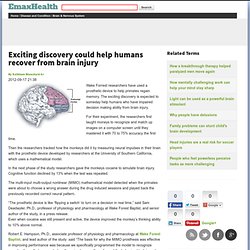
The exciting discovery is expected to someday help humans who have impaired decision making ability from brain injury. For their experiment, the researchers first taught moneys to recognize and match up images on a computer screen until they mastered it with 70 to 75% accuracy the first time. Then the researchers tracked how the monkeys did it by measuring neural impulses in their brain with the prosthetic device developed by researchers at the University of Southern California, which uses a mathematical model. In the next phase of the study researchers gave the monkeys cocaine to simulate brain injury. Cognitive Rehabilitation Word Game Quizzes. Cognitive rehabilitation can be helped by performing regular cognitive exercises that force the brain to work a little.
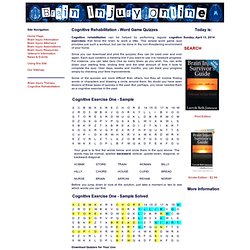
This simple word game quiz provides just such a workout, but can be done in the non-threatening environment of your home. Since you can download and print the quizzes, they can be used over and over again. Each quiz contains a tracking line if you want to use it to measure progress. For instance, you can take Quiz One as many times as you wish. You can write down your starting time, ending time and the total amount of time it took to complete the quiz. Some of the quizzes are more difficult than others, but they all involve finding words or characters and drawing a circle around them. Before you jump down to look at the solution, just take a moment or two to see which words you can find. Download Quizzes for Your Use To use these quizzes, all you need is a computer, a pdf reader and a printer. Click here to download Cognitive Rehabilitation Quiz One. BrainLine.org.
Breakthrough Treatment of Traumatic Brain Injuries. Diffusion Tensor Imaging May Improve Diagnosis and Tracking of Mild Traumatic Brain Injuries. For release: Thursday, March 4, 2010.
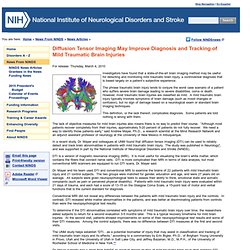
Brain Injury Online Information for Everyone. Traumatic Brain Injury - TBI & Head Injury Resource. Entire CGP Catalog - Results List. Brain Injury, TBI, Traumatic Brain Injury, Brain Injury Coma, Subdural Hematoma. Eradicate the Use of the Word Mild to Describe Brain Injury Historically, brain injuries were classified as mild, moderate and severe based upon the duration of loss of consciousness.
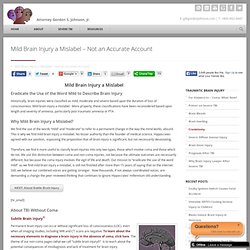
Mild brain injury a mislabel. More properly, these classifications have been reconsidered based upon length and severity of amnesia, particularly post traumatic amnesia or PTA. Why Mild Brain Injury a Mislabel? We find the use of the words “mild” and “moderate” to refer to a permanent change in the way the mind works, absurd. OT TBI Guidelines. Referral Occupational Profile The purpose of the occupational profile is to determine who the client or clients are, identify their needs or concerns, and ascertain how these concerns affect engagement in occupational performance.
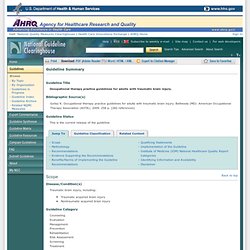
Information for the occupational profile is gathered through formal and informal interviews with the client and significant others. Conversations with the client help the occupational therapist gain perspective of how the client spent his or her time; what activities the client wants or needs to do; and how the environment in which the client lives, works, and plays supports or hinders occupational engagement. Taking the 'Mild' Out of Mild Traumatic Brain Injury : Neurology Today. Traumatic brain injury has been called the “signature wound” of the Iraq and Afghanistan wars.
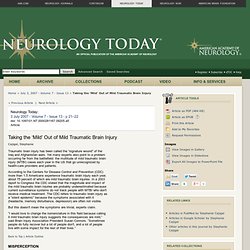
Yet many experts also point to a problem occurring far from the battlefield: the multitude of mild traumatic brain injury (MTBI) cases each year in the US that go unrecognized by health-care providers and patients. According to the Centers for Disease Control and Prevention (CDC) more than 1.5 Americans experience traumatic brain injury each year, about 75 percent of which are mild traumatic brain injuries.
In a 2003 report to Congress the CDC stated that the magnitude and impact of the mild traumatic brain injuries are probably underestimated because current surveillance systems do not track people with MTBI who don't receive medical treatment. The CDC refers to traumatic brain injury as a “silent epidemic” because the symptoms associated with it (headache, memory disturbance, depression) are often not visible. But this doesn't mean the symptoms are trivial, experts claim. Dr. Dr. Gregory J. Traumatic Brain Injury by bjscloset.
Brain Injury Initiative Survival Guide - Alberta Seniors. Working with people with TBI: Staff Self-Study Module 3. Aim The module is for support workers who provide direct care and assistance to people who have had traumatic brain injury (TBI).
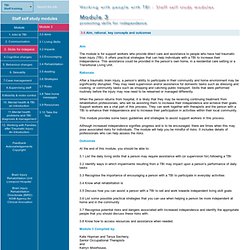
It offers practical strategies that can help individuals with a TBI to increase their independence. This assistance could be provided in the person’s own home, in a residential care setting or a Transitional Living Unit. Rationale After a traumatic brain injury, a person’s ability to participate in their community and home environment may be significantly disrupted. When the person returns from hospital, it is likely that they may be receiving continuing treatment from rehabilitation professionals, who will be assisting them to increase their independence and achieve their goals. This module provides some basic guidelines and strategies to assist support workers in this process. Although increased independence signifies progress and is to be encouraged, there are times when this may pose associated risks for individuals. Outcomes 3.4 Know what rehabilitation is.
Resources for People with Traumatic Brain Injury (TBI) - BrainLine.org. “I’m not me anymore, but I’m still me.” So say — or think — many people who have sustained a traumatic brain injury. In this section for people with TBI, you will find information about diagnosis and treatment, assistive technologies to help at home and at work, headache and sleeping problems, and guidance on how to make new friends and build lasting relationships among other topics. How emotional functioning can be impacted by traumatic brain injury - by Peter Sedesse. Paul Simms's image for: